20th-century painter and printmaker Hu Yichuan stayed true to his ideals, using art as a tool to awaken people's minds and transform society, Lin Qi reports.
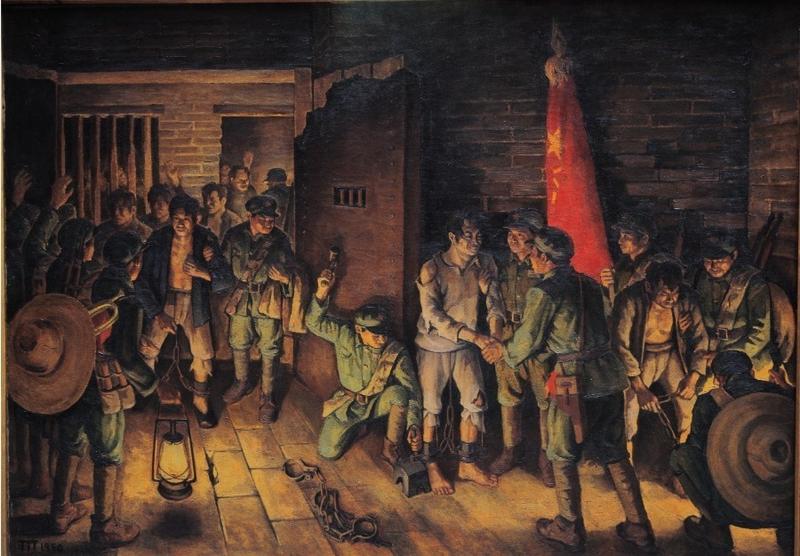 Unlocking Shackles is among the pieces created by artist Hu Yichuan on show at the ongoing exhibition that marks the 110th anniversary of Hu's birth at the Central Academy of Fine Arts in Beijing. (PHOTO PROVIDED TO CHINA DAILY)
Unlocking Shackles is among the pieces created by artist Hu Yichuan on show at the ongoing exhibition that marks the 110th anniversary of Hu's birth at the Central Academy of Fine Arts in Beijing. (PHOTO PROVIDED TO CHINA DAILY)
Hu Yichuan (1910-2000), a prominent painter and printmaker of the 20th century, lived up to his motto that one should "stand on the front line of life" and "bravely run to the forefront of his era and be a flag-bearer".
Throughout his career, which spanned six decades, Hu created an oeuvre to express a sincere concern for people at the grassroots, as well as a fighting spirit in the face of oppression and national crisis.
His commitment to making art that caters to people's needs in different times is still held dear by his followers.
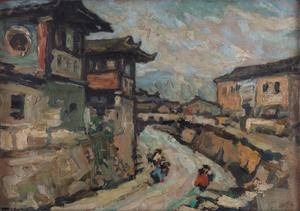 My Hometown is among the pieces created by artist Hu Yichuan on show at the ongoing exhibition that marks the 110th anniversary of Hu's birth at the Central Academy of Fine Arts in Beijing. (PHOTO PROVIDED TO CHINA DAILY)
My Hometown is among the pieces created by artist Hu Yichuan on show at the ongoing exhibition that marks the 110th anniversary of Hu's birth at the Central Academy of Fine Arts in Beijing. (PHOTO PROVIDED TO CHINA DAILY)
In memory of the 110th anniversary of Hu's birth, the Central Academy of Fine Arts and Guangzhou Academy of Fine Arts are jointly presenting an exhibition at the CAFA museum reviewing Hu's life and art.
The show, which runs until Dec 23, navigates Hu's dual accomplishments in oil painting and woodcuts, shows works on loan from several cultural institutions, including the National Museum of China and National Art Museum of China.
It also pays tribute to Hu's dedication to art education after the founding of the People's Republic of China in 1949. He worked alongside prominent artist Xu Beihong to establish the Central Academy of Fine Arts and taught oil painting. Years later, he co-founded the Guangzhou Academy of Fine Arts which he presided over for decades until his retirement in 1983.
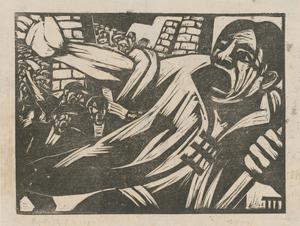 To the Forefront is among the pieces created by artist Hu Yichuan on show at the ongoing exhibition that marks the 110th anniversary of Hu's birth at the Central Academy of Fine Arts in Beijing. (PHOTO PROVIDED TO CHINA DAILY)
To the Forefront is among the pieces created by artist Hu Yichuan on show at the ongoing exhibition that marks the 110th anniversary of Hu's birth at the Central Academy of Fine Arts in Beijing. (PHOTO PROVIDED TO CHINA DAILY)
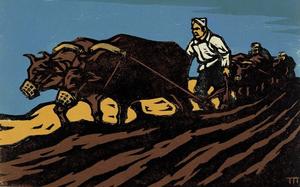 Teammates is among the pieces created by artist Hu Yichuan on show at the ongoing exhibition that marks the 110th anniversary of Hu's birth at the Central Academy of Fine Arts in Beijing. (PHOTO PROVIDED TO CHINA DAILY)
Teammates is among the pieces created by artist Hu Yichuan on show at the ongoing exhibition that marks the 110th anniversary of Hu's birth at the Central Academy of Fine Arts in Beijing. (PHOTO PROVIDED TO CHINA DAILY)
Hu's many works often reflect the plight of farmers and the working class in cities and document the course of the Chinese people seeking national independence and fighting injustice. He was deeply influenced by the expressionist movement and especially by German artist Kathe Kollwitz.
Fan Di'an, dean of the Central Academy of Fine Arts, says Hu's continuous care for the most underprivileged was "deeply rooted in his heart, for he himself was one of them".
Hu grew up in an underdeveloped village in western Fujian province. After his mother died, he joined his father in Indonesia who struggled to make a living by mending watches.
Thanks to the financial support of local Chinese communities, Hu was sent back to China where he attended middle school and later enrolled in the painting department of Hangzhou Fine Art School, now China Academy of Art.
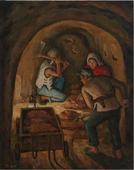 Digging Tunnel is among the pieces created by artist Hu Yichuan on show at the ongoing exhibition that marks the 110th anniversary of Hu's birth at the Central Academy of Fine Arts in Beijing. (PHOTO PROVIDED TO CHINA DAILY)
Digging Tunnel is among the pieces created by artist Hu Yichuan on show at the ongoing exhibition that marks the 110th anniversary of Hu's birth at the Central Academy of Fine Arts in Beijing. (PHOTO PROVIDED TO CHINA DAILY)
Hu and his schoolmates often traveled to Shanghai to see new art and cultural trends. It was there where they were introduced to the art of woodcut printing by Lu Xun, the noted writer and print collector. He initiated an art movement among young people, encouraging them to make woodcut prints, which didn't cost much money, were easy to make and quick to spread-and therefore convenient to carry revolutionary ideas to the common people.
Hu came to realize the importance of art as a tool to awaken people's minds and fulfill his ideal of social transformation. He later recalled in a short memoir in 1993 that Lu Xun often sponsored young artists in staging woodcut exhibitions. He himself also wrote prefaces for the shows.
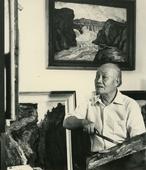 Hu Yichuan works on a painting at home in Guangzhou in 1986. (PHOTO PROVIDED TO CHINA DAILY)
Hu Yichuan works on a painting at home in Guangzhou in 1986. (PHOTO PROVIDED TO CHINA DAILY)
Hu's productivity in art further erupted after he arrived in Yan'an, then the cradle of the Chinese Communist movement, in Shaanxi province in 1937. He made several iconic woodcuts and oil paintings that documented how people fought for national independence under the lead of the Communist Party of China.
In the years when Hu was much occupied with administrative duties at school, he continued to produce oil paintings of historic events and landscapes. In these works he invited the audience to savor the pains and joys of life.
He once said: "Without feeling pain, one will not treasure happiness; and without happiness, one will not be saddened by pain. Pain and happiness are like a married couple, never to part."
Du Jian, a former student and retired professor at the Central Academy of Fine Arts, says Hu was a man with a broad mind and unassailable honesty. "His works always reflect genuine feelings. But it is his noble character that make his art eternal."
Contact the writer at linqi@chinadaily.com.cn


